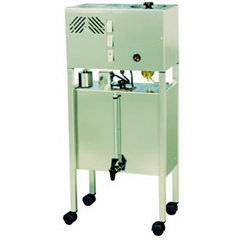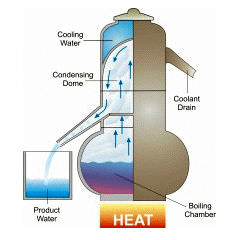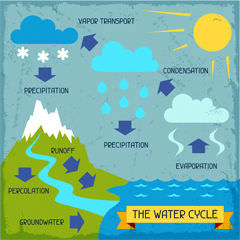Water Distillation
What is Water Distillation?
Water distillation is a method through which water is boiled in a unit to produce steam or vapor.
The steam is then condensed back into a container, resulting in water that is of high quality.
It is used for many purposes including drinking water, aquariums and in the cooling system of vehicles.
Water Distillation
For drinking water that is free of bacteria, viruses, organic compounds and heavy metals.
What are the benefits of Water Distillation?
Myths about distilled drinking water - Joe Letorney, Jr.
Myth 1: Distillation takes out all the beneficial minerals.
This is a statement used countless times, usually from literature from some filter companies trying to tell you in effect, that their filters take out all the bad contaminants, but leave in the good, beneficial minerals. Fortunately, there are many reputable companies who would never think of making this kind of claim in their ads.
Distillation will kill and remove bacteria, viruses, cysts, as well as, heavy metals, radionuclides, organics, in organics, and particulates. And, yes, it will also remove minerals which will fall under inorganic contaminants. Whether the minerals in water are beneficial or useless has been an ongoing debate. All of our minerals are derived from our food: fresh fruits, vegetables, meat, poultry, grains, nuts and dairy products. The minerals in water are so scant that in some places for example, one would have to drink to obtain the recommended Daily Allowance (RDA):
It seems insane to even think about drinking that much water. Most people cannot even drink the recommended 8 glasses of water a day that is widely advocated by health experts.
When you think of pure water what definition comes to your mind? It should be just H²0 and that’s all. It’s not H²0 with minerals and fluoride, because that doesn’t fit the description of pure water. For all intent purposes, distilled water comes closest to the definition of pure drinking water. The process of distillation removes the broadest range of contaminants over any point of use (POU) system.
Myth 2: Distilled water leaches minerals from your body.
What the proponents of this Myth want you to believe are that because distilled water is so pure, drinking it will leach minerals from your body, thereby robbing you of good health and nutrition. There is no basis of fact to document this claim. The national best-seller health and diet book: “Fit for Life II: Living Health”, answers this question in the following excerpt:
“Distilled water has an inherent quality. Acting almost like a magnet, it picks up rejected, discarded and unusable minerals and, assisted by the blood and the lymph, carries them to the lungs and kidneys for elimination from the body. The statement that distilled water leaches minerals from the body has no basis in fact. It doesn't leach out minerals that have become part of the cell structure. It can’t and it won’t. It collects only minerals that have already been rejected or excreted by the cells . . .to suggest that distilled water takes up minerals from foods so that the body derives no benefit from them is absurd.”
 |  |
The Hydrologic Cycle
The Hydrologic cycle, also known as the H2O or water cycle, is nature's distillation process.
It is the constant process of water moving between the surface of the earth, below earth and above earth.
Water is always continuously changing from liquid to vapor to ice to liquid to vapor.
Myth 3: Distilled water tastes bland or has a “flat taste”.
This is probably the most popular myth surrounding distilled water. I have often read this statement from various articles written on water treatment systems. When the articles refer to distillation, they will usually say it removes the minerals that will leave a ‘flat taste’. I’d be willing to bet that the authors of these types of articles never tasted freshly made distilled water from a home distiller. These types of false remarks misinform consumers so they have preconceived notions about distilled water before they even try it. The mistruth about distilled water having a ‘flat taste’ can be explained in several ways.
First, in years past, the original distillers did not incorporate any pre or post carbon filtration. If you’ve tasted straight distilled water made without the use of any pre or post carbon filtration, it might have a steamy taste or off taste.
The use of carbon filtration with distillation is as follows:
Tap or Well water is first sent through a pre-filter to help take out chlorine, odours, sediment and other organic contaminants before it reaches the boiling tank of the distiller. After the steam is condensed into distilled water it is finally passed through a carbon post filter to remove any potential gases or Volatile Organic Contaminants (VOC’S) that might have escaped during the boiling process. Not using a post filter to clean up any volatile gases, which can produce an off-taste that may have escaped during the boiling process.
Second, another reason for distilled water having this label for ‘flat taste’ is someone accustomed to drinking chlorinated or well water high in iron content for a long time. When they are suddenly introduced to distilled water for the first time, it is a shock, noticeable to their taste buds. People raised on high iron in their well water for instance, would be used to its ‘sweet’ taste, but when given distilled water, one might say it tastes ‘flat’ since it is iron free.
Taste is the number one reasons that consumers buy bottled water. It is a $5 billion market. Many consumers are led to believe that you need minerals in water to give it its taste. It is actually oxygen that gives water its taste. Water shouldn’t have a taste or a metallic after bite. Try either a cold or room temperature glass of freshly made distilled water and taste the difference for yourself . . . it’s delicious.
A third reason for the ‘flat taste’ is theory is buying distilled water in the store. Distilled water, as virtually all bottled water, is stored in cheap plastic containers. Some have been known to leach methyl chloride, a carcinogen, into the water and also gives off plastic tastes and odours. Water has been called the universal solvent, whatever it touches it will pick up.
Distilled water being virtually 100% contaminant free might leach plastic tastes into the water from the inferior bottle it’s being stored in. Besides glass, consider buying bottles made from Lexan that won’t give off any plastic tastes or odours.
 |  |
Contact:
George Hogg
WTC
Email:
info@waterbygeorge.ca
Cell:
780 871 9283
Phone:
780 809 2256
Postal Address:
PO Box 12699
Lloydminster, AB T9V 0Y4
